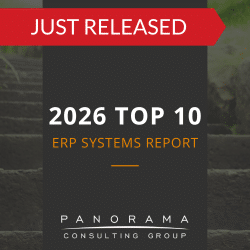- AI technology is taking over many routine tasks, but entirely new categories of human expertise and skill sets are becoming essential.
- As executives contemplate new job roles created by AI, they must determine which employees are well-suited to these strategic AI positions.
- The role of ERP AI Ethics Lead not only provides a solution to technology taking jobs, but it ensures your ERP system makes fair, transparent decisions.
Is technology taking jobs or creating them?
Much has been written and debated on this topic. Optimists highlight new job roles created by AI, while skeptics sound alarm bells that AI technology is taking over jobs.
It’s true. AI technology is taking over many routine tasks. However, at the same time, entirely new categories of human expertise and skill sets are becoming essential.
While AI-powered ERP systems are remarkable tools, human judgment, creativity, and ethics will remain essential. This will lead to the creation of new job roles in 2025 and beyond that don’t exist today.
Executives must take an active role in planning for these roles now, not only as a solution to technology taking jobs but as a strategy to position their organizations competitively.
When it comes to ERP implementations, planning for these roles before project kickoff ensures you realize the most value from your investment.
2025 Clash of the Titans
SAP, Oracle, Microsoft, and Infor each have a variety of systems that can support data-driven decision-making. We surveyed customers of these four vendors to find out what their selection and implementation process was like.
New Job Roles Created by AI-Powered ERP Systems
As ERP systems increasingly leverage AI, executives will discover new human roles emerging that go beyond traditional IT boundaries. These roles will demand a blend of business acumen, technological insight, and ethical judgment.
Here are four new roles that C-level leaders should consider integrating into their organizational strategies before embarking on an ERP project:
1. ERP AI Ethics Lead
Issues of ethical AI use and transparency will become increasingly critical, particularly around ERP data governance, algorithm bias, and decision-making transparency.
AI-enabled ERP systems make sensitive, consequential business decisions—such as credit approvals, pricing strategies, and employee evaluations—requiring clear ethical guidelines and scrutiny.
An ERP AI Ethics Lead would ensure compliance while actively shaping your organization’s ethical AI policy, interpreting AI outcomes, and mediating AI-driven business decisions when issues arise.
In this role, they would proactively monitor for unintended biases and ethical risks emerging from AI models, while working with executives to maintain alignment between technology and corporate values.
This role not only provides a solution to technology taking jobs, but it ensures your ERP system makes fair, transparent decisions that reflect your organization’s values.
Expert Insight
Our ERP selection consultants have seen that organizations investing in AI Readiness are far better prepared to define AI-related job roles. The role of ERP AI Ethics Lead cannot succeed without a strong foundation of clear data practices and ethical guidelines.
2. ERP-Human Interaction Designer
While AI promises remarkable efficiencies, its real-world impact hinges on user adoption and trust.
An ERP-Human Interaction Designer would specialize in ensuring that AI-powered ERP systems are easy for employees to understand and trust, fitting naturally into their daily work.
Questions they might ask in this role include:
- “Do employees clearly understand what the AI system is recommending?”
- “Do they trust the system enough to rely on automated processes or are they using workarounds?”
- “Are employees confident about what to do when the AI system flags an anomaly?”
For example, an industrial manufacturer wanting to ensure high ERP adoption rates, might use the role of ERP-Human Interaction Designer to create AI dashboards that production supervisors can quickly interpret and easily use to automate quality checks.
3. ERP AI Oversight Auditor
Your AI-powered ERP will become so central to business processes that transparency into its inner workings will be vital.
An AI Oversight Auditor would regularly analyze AI-generated outputs, decision logic, and training data quality to ensure accuracy and transparency.
In this role, the auditor would:
- Regularly check AI recommendations against your business priorities and strategic objectives.
- Ensure AI outputs consistently meet regulatory requirements and industry standards.
- Review AI decisions for fairness and transparency, verifying they uphold your organization’s ethical values and commitments.
- Provide independent reports to senior executives highlighting any issues and giving them the confidence that the system’s automation aligns with strategic intent.
4. ERP Data Intelligence Advocate
As AI systems become more powerful, the quality, security, and governance of data will only grow more critical.
The ERP Data Intelligence Advocate would:
- Set clear guidelines for how data should be gathered and used.
- Ensure the data informing your AI is accurate, reliable, and ethically collected.
- Champion a culture of data literacy and ethical data use across the organization.
For example, our ERP system consultants often find a lack of data literacy among operational managers and frontline supervisors. In these cases, a role like ERP Data Intelligence Advocate could be used to develop simple data standards and training programs that help operational teams enter, manage, and interpret data correctly in the ERP system.
Who Should Fill These New Job Roles for 2025?
The emerging roles we’ve highlighted won’t necessarily reside in the C-suite but will certainly report closely to senior executives. These roles are strategic, influential, and multidisciplinary, blending technical expertise with business insight and ethical clarity.
Employees who could naturally transition into these strategic AI roles include:
- Senior IT and ERP Managers who already manage complex ERP systems and bridge technology with business strategy.
- Data Governance and Compliance Managers experienced in managing data quality, compliance, and regulatory matters.
- Business and Systems Analysts with deep experience translating business needs into technology solutions.
- Ethics and Corporate Responsibility Specialists who understand organizational values and ethical frameworks.
On the other hand, frontline operational employees—such as production line supervisors and customer service representatives—are typically better suited to reskill toward operational roles enhanced by AI-driven insights and automation.
This reskilling process will likely focus on mastering new tools, processes, and workflows rather than transitioning into specialized strategic roles.
For example, an accounts payable clerk might be reskilled to use an AI-powered finance system to review and validate automated invoice matching results and investigate exceptions flagged by the system. This reflects how a role at high risk of automation can transition into an oversight and exception-management function that adds strategic value rather than being fully displaced.
AI-Powered ERP Systems Demand Human Excellence
The debate surrounding whether technology is taking jobs or creating them is not going away anytime soon. Yet the thoughtful executive sees beyond this polarized debate. In the landscape of AI-powered ERP, the more pressing matter is understanding the nature and value of the human roles AI creates.
Our independent ERP consultants can help you define the specific roles, skills, and data capabilities needed for AI enablement. Our technology-agnostic approach ensures you evaluate AI opportunities across business processes and human capabilities, rather than simply aligning to a vendor’s roadmap. Contact us to learn more.














